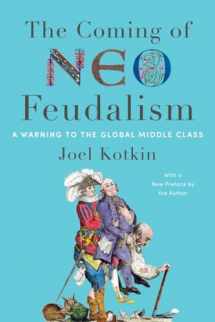
The Coming of Neo-Feudalism: A Warning to the Global Middle Class
Book details
Summary
Description
Review
“Kotkin has written an essential and critical study of emerging class structures at the intersection of technological determinism and post-industrial capitalism. He suggests that technological oligarchs are already controlling our economic future while creating a high-tech neo-feudal society that undermines democracy and economic mobility for the middle and working classes.”
--John Russo, Visiting Scholar, Kalmanovitz Initiative for Labor and Working Poor at Georgetown University, Co-editor, Working-Class Perspectives
“Our society and economy is no longer progressing but regressing into a kind of “neo-feudalism.” As Joel Kotkin describes it, our once-great middle class is being eviscerated and America is dividing into a small group of uber-wealthy oligarchs who have colonized luxury cities like San Francisco and New York. A gripping cautionary tale by one of the most provocative and original thinkers of our time, this book is a must read for all those concerned about the future of our cities and our society.”
--Richard Florida, author of The Rise of the Creative Class and The New Urban Crisis.
“The social and economic divide which Kotkin has identified is certainly real, and very easy for those who have spent all their time on one side to overlook.… Kotkin’s warning in this timely, compelling, and well-written book should be heeded.”
—Quillette
“Kotkin rightfully places his finger on a phalanx of attitudes, beliefs, and practices of our recently ascendant economic elite and their apologists and allies in the symbol-mongering institutions.”
—Richard M. Reinsch, Law & Liberty
“Among the books that could end up defining the times in which we find ourselves here in the United States and throughout the world—from South America to Italy to the South China Sea—Kotkin’s work is not as widely read and discussed. But it ought to be.”
—John Loftus, National Review
“The alarm Kotkin sounds is all the more courageous and credible coming from an old-school progressive like him, and shows that the left’s realignment around the interests of tech oligarchs and the gospel of wokeism won’t go without internal pushback.”
—The American Conservative
“Kotkin marshals a host of arresting economic data to demonstrate the widening gulf between the feudal lords and everyone else.”
—The Russell Kirk Center
“A triumph.”
—Front Porch Republic
Following a remarkable epoch of greater dispersion of wealth and opportunity, we are inexorably returning towards a more feudal era marked by greater concentration of wealth and property, reduced upward mobility, demographic stagnation, and increased dogmatism. If the last seventy years saw a massive expansion of the middle class, not only in America but in much of the developed world, today that class is declining and a new, more hierarchical society is emerging.
The new class structure resembles that of Medieval times. At the apex of the new order are two classes―a reborn clerical elite, the clerisy, which dominates the upper part of the professional ranks, universities, media and culture, and a new aristocracy led by tech oligarchs with unprecedented wealth and growing control of information. These two classes correspond to the old French First and Second Estates.
Below these two classes lies what was once called the Third Estate. This includes the yeomanry, which is made up largely of small businesspeople, minor property owners, skilled workers and private-sector oriented professionals. Ascendant for much of modern history, this class is in decline while those below them, the new Serfs, grow in numbers―a vast, expanding property-less population.
The trends are mounting, but we can still reverse them―if people understand what is actually occurring and have the capability to oppose them.


We would LOVE it if you could help us and other readers by reviewing the book
Book review



